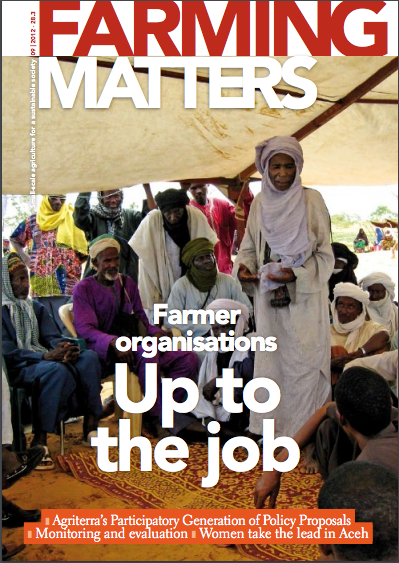The past decade has witnessed the growing and strengthening of peasant and family farmers’ movements around the world: organisations such as La Via Campesina, ROPPA, PROPAC and AFA have strengthened their voices in regional and global fora.
Organisations of small-scale ecological producers are growing at both local and national levels. Peasants and family farmers are rebuilding and reclaiming their identities, against the grain. They have put food sovereignty on the global agenda.
Many development agencies consider the integration of smallscale producers and their organisations into value chains as a priority issue. But there is more at stake: as Christian Gouët says in this issue of Farming Matters, all over the world, farmers are seriously constrained by policies and regulations. They need to participate in policy dialogues and decision-making processes.
Clearly, not all farmers are buying into the global agribusiness model. Mamadou Coulybaly, the Secretary General of the National Peasants Organisation of Mali (CNOP) explicitly raised this point at one of the preparatory meetings for the Rio+20 conference when he asked about the “model to achieve a green economy”: “Monocultures are bad for biodiversity. Growing crops that need a huge amount of mineral fertilizers damages the soil. Such development models defeat the purpose of a truly green economy. We are not against markets. But we want family farming to survive as a way of life and want to feed our population”.
These are remarkable developments at a time when land grabs are happening at an unprecedented scale – and when the chairman of the Executive Board of Wageningen University claims that the Dutch model of intensive agriculture is the one that will feed the world in 2050.
Strong organisations of family farmers are showing the world that farming is about more than money. Let farmers’ organisations share their experiences, so as to inspire others. There is still a long way to go, and the challenges are only increasing. But peasants and family farmers’ movements have gathered strength in Rio and will build further on this, with the International Year of Family Farming around the corner.
Edith van Walsum
director ILEIA

